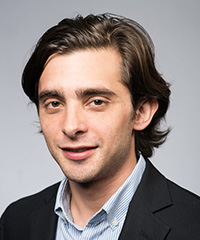
Marc D. Porosoff
Associate Professor of Chemical Engineering
PhD, Columbia University, 2015
- Office Location
- 4405 Wegmans Hall
- Telephone
- (585) 276-7401
- Fax
- (585) 273-1348
- Web Address
- Website
Research Overview
The Porosoff group focuses on developing new catalysts for upgrading C1 resources for efficient energy storage and low-cost production of plastics, chemicals and fuels. Our research interests are at the cutting-edge of the field of catalysis, where we are applying new experimental techniques for more precise control over catalyst phases and reaction pathways. We are also pioneering representation of catalysts using the text of synthesis procedures and reaction conditions, which is recently made possible by advances in large language models (LLMs).
Research Interests
- CO2 capture and conversion
- Heterogeneous thermal catalysis
- Catalyst representation with large language models
- Reactive separations
Courses Taught
- CHE 150: Introduction to Sustainable Energy
- CHE 461: Advanced Chemical Kinetics
Selected Publications
- Liu, R.; El Berch, J.N.; House, S.; Meil, S.W.; Mpourmpakis, G.; Porosoff, M.D., "Reactive Separations of CO/CO2 mixtures over Ru-Co Single Atom Alloys," ACS Catalysis, 2023, 13, 4, 2449-2461. DOI: 10.1021/acscatal.2c05110
- Juneau, M.; Yaffe, D.; Liu, R.; Agwara, J.N.; Porosoff, M.D., "Establishing tungsten carbides as active catalysts for CO2 hydrogenation," Nanoscale, 2022. DOI: 10.1039/d2nr03281c
- Agwara, J.N.; Bakas, N.J.; Neidig, M.L.; Porosoff, M.D., "Challenges and Opportunities of Fe-based Core-Shell Catalysts for Fischer-Tropsch Synthesis," ChemCatChem, 2022, e202200289. DOI: 10.1002/cctc.202200289
- Liu, R.; Leshchev, D.; Stavitski, E.; Juneau, M.; Agwara, J.N.; Porosoff, M.D., "Selective hydrogenation of CO2 and CO over potassium promoted Co/ZSM-5," Applied Catalysis B-Environmental, 2021, 284, 119787. DOI 10.1016/j.apcatb.2020.119787
- Wang, D.; Xie, Z.; Porosoff, M.D.; Chen, J.G., "Recent Advances in Carbon Dioxide Hydrogenation to Produce Olefins and Aromatics," CHEM, 2021, 7, 9, 2277-2311. DOI: 10.1016/j.chempr.2021.02.024
- Juneau, M.; Pope, C.; Liu, R.J.; Porosoff, M.D., "Support Acidity as a Descriptor for Reverse Water-Gas Shift Over Mo2C-Based Catalysts," Applied Catalysis A-General, 2021, 620, 118034. DOI:10.1016/j.apcata.2021.118034
- Liu, R.J.; Ma, Z.; Sears, J.D.; Juneau, M.; Neidig, M.L.; Porosoff, M.D., "Identifying Correlations in Fischer-Tropsch Synthesis and CO2 hydrogenation over Fe-based ZSM-5 Catalysts," Journal of CO2 Utilization, 2020, 41, 101290. DOI:10.1016/j.jcou.2020.101290
- Juneau, M.; Vonglis, M.; Hartvigsen, J.; Frost, L.; Bayerl, D.; Dixit, M.; Mpourmpakis, G.; Morse, J.R.; Baldwin, J.; Willauer, H.; Porosoff, M.D., "Assessing the Viability of K-Mo2C for Reversed Water-Gas Shift Scale-Up: Molecular to laboratory to Pilot Scale," Energy and Environmental Science, 2020, 13, 8, 2524-2539. DOI: 10.1039/d0ee01457e
- Juneau, M.; Liu, R.J.; Peng, Y.; Malge, A.; Ma, Z.; Porosoff, M.D., "Characterization of Metal-elite Composite Catalysts: Determining the Environment of the Active Phase," ChemCatChem, 2020, 12, 1-28. DOI:org/10.1002/cctc.201902139
- Morse, J.R.; Juneau, M.; Baldwin, J.W.; Porosoff, M.D.; Willauer, H.D., "Alkali Promoted Tungsten Carbide as a Selective Catalyst for the Reverse Water Gas Shift Reaction," Journal of CO2 Utilization, 2019, 35, 38-46. DOI: 10.1016/j.jcou.2019.08.024
- Ma, Z.; Porosoff, M.D., "Development of Tandem Catalysts for CO2 Hydrogenation of Olefins," ACS Catalysis, 2019, 9, 3, 2639-2656. DOI.org/10.1021/acscatal.8b05060
- Dixit, M.; Peng, X.; Porosoff, M.D.; Wilauer, H.D.; Mpourmpakis, G., "Elucidating the Role of Oxygen Coverage in CO2 Reduction on Mo2C," Catalysis Science & Technology, 2017, 7, 23, 5521-5529.
- Porosoff, M.D.; Baldwin, J.W.; Peng, X.; Mpourmpakis, G.; Willauer, H.D., "Potassium-Promoted Molybdenum Carbide as a Highly Active and Selective Catalyst for CO2 Conversion to CO," Chemsuschem, 2017, 11, 2408-2415.
Honors
- Scialog Negative Emissions Science (NES) Fellow, 2022 and 2023
- Wadsworth C. Sykes Engineering Faculty Award, 2021 and 2022
- University Research Award, University of Rochester, 2018 and 2022
- NRC Postdoctoral Fellow, NRC Research Associateship Program, 2015
